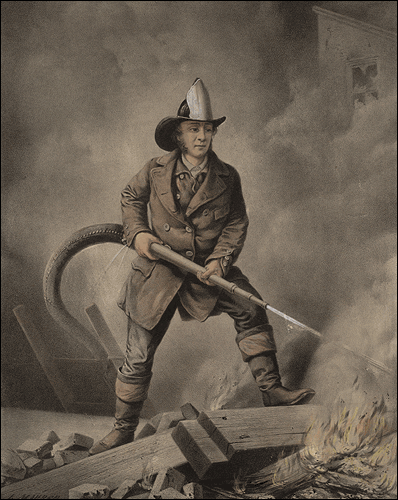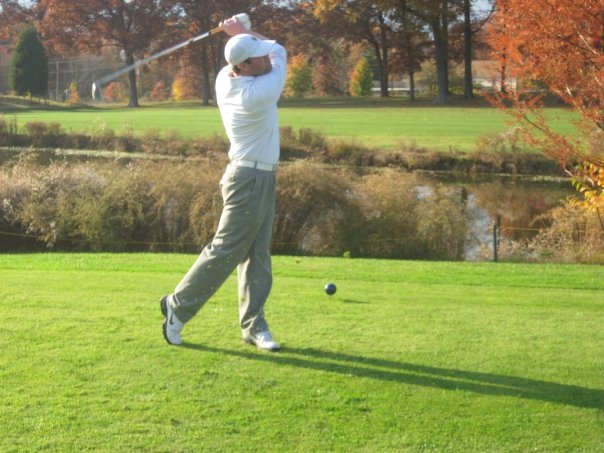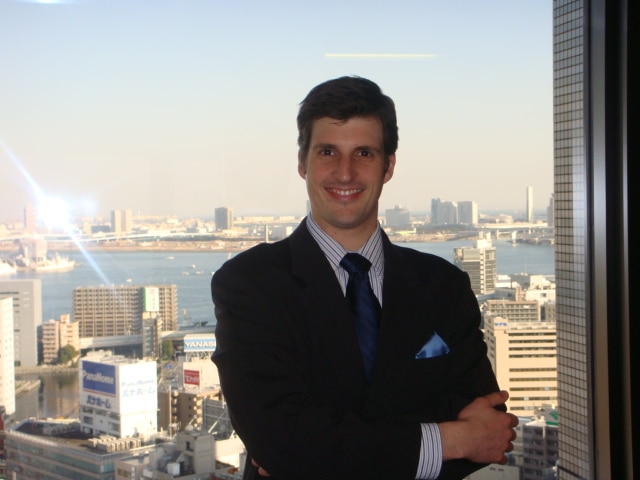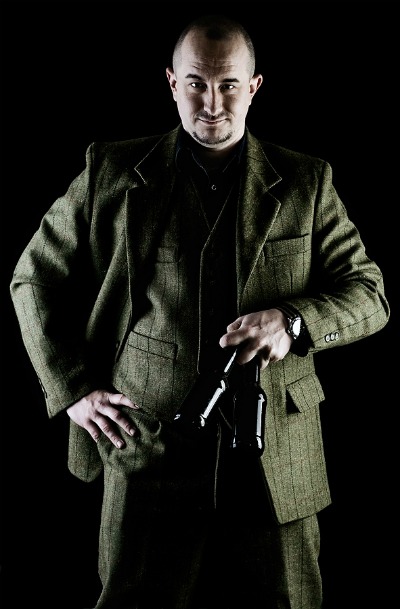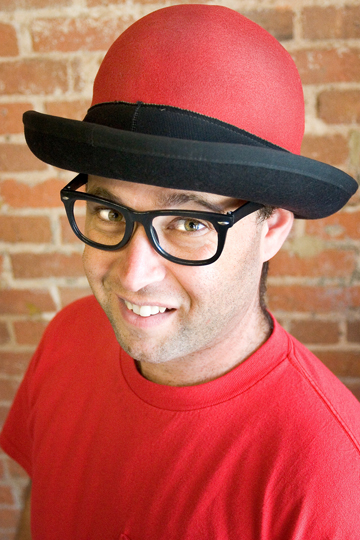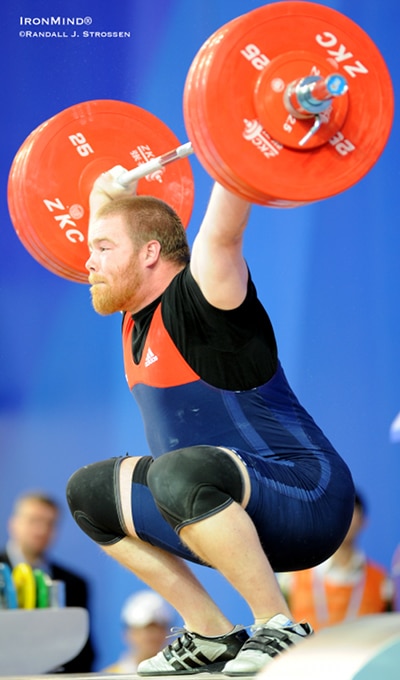
Once again we return to our So You Want My Job series, in which we interview men who are employed in desirable jobs and ask them about the reality of their work and for advice on how men can live their dream.
Daah daah duh don don don da. That was the Olympic “fanfare and theme.” So hard to convey in writing. Every four years the world’s top athletes gather to compete against the very best of the best. They compete for country, for glory, and for the love of their sport. For these athletes, the Olympics are the culmination of years of all-consuming training, of copious amounts of blood, sweat, and tears spent in the pursuit of one goal: the sound of their national anthem playing as the gold medal is placed around their necks.
Casey Burgener knows all about the highs and lows of this struggle for athletic glory. He’s been competing in Olympic-style weightlifting for almost two decades. He and his wife Natalie, who is also a weightlifter and competed in the 2008 Olympics, live together at the Olympic Training Center in Colorado Springs, Co.
Casey qualified to compete in the 2008 Olympics but had his spot taken from him the night before the opening ceremonies when weightlifters from other countries were disqualified, thus changing the results of the qualifying rounds. Such a disappointment might have crushed a lesser man, but Casey just got back to work, setting his mind on training for another four years to compete in London in 2012. Not only is Casey a man of great resiliency, he also has an amazingly sweet red beard. I’m sure the AoM army will be cheering on Captain Redbeard the Fierce next year when Casey goes for the gold.
1. Tell us a little about yourself (Where are you from? How old are you? Describe your job and how long you’ve been at it, etc).
I’m originally from a little town in Northern San Diego County named Bonsall, but I currently live in Colorado Springs, CO. I’m 28 years old, and I’ve been competing in Olympic-style weightlifting since I was 12.
My father was a high school strength coach and is extremely passionate about weightlifting, so he had me start training to develop some extra athleticism, speed, and body awareness for the other sports I was playing at the time.
2. A lot of men lift weights as a hobby. When did you know that you wanted to really make a go of the sport and compete at the highest levels in the world?
I switched over to lifting full-time when I was 15, and I knew that it was something I wanted to pursue at a high level after watching the 1996 Olympics in Atlanta. My father volunteered at the Games and was able to work in the back rooms with all the weightlifting athletes and coaches. The stories he told about his experiences in Atlanta made pursuing the Olympics very appealing.
Another big incentive was the travel. I remember playing baseball when I was younger and thinking, “I’ll never play outside San Diego County, but if I lift, I can compete around the world.” I love to travel.
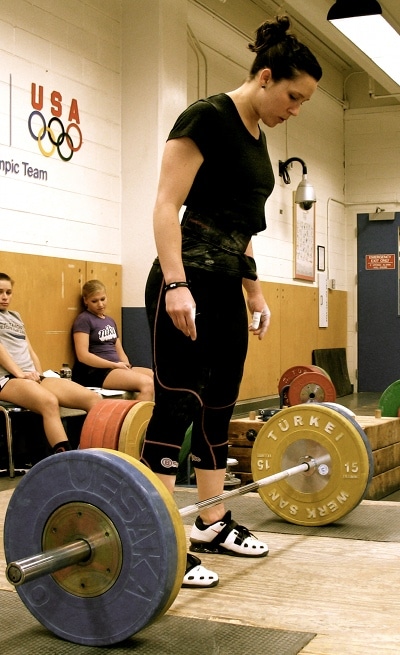
Casey’s wife Natalie is also an Olympic weightlifter. Female Olympic lifters aren’t scary huge (or tanned and oily) like the female bodybuilders you see in other competitions where juicing is the norm and getting ripped is the end goal.
3. You and your wife live at the Olympic Training Center. Do the majority of Olympic athletes/hopefuls choose to do that or do many train on their own in various locales? What’s the advantage of living at the center?
It depends on what sport you’re talking about. There are currently three Olympic Training Centers in the US. They’re located in Colorado Springs, Lake Placid, and Chula Vista. Each one has different sports that train there full-time. Most of the bigger sports (swimming, track and field, women’s gymnastics, etc.) will typically use the training centers for camps, but not to house residents. I wouldn’t say the majority of Olympic athletes/hopefuls choose the OTC as there is a limited amount of space or they don’t have access to it, but I think a lot of athletes would like to use it full-time. Regardless of whether or not someone has permission to use the OTC, the most important aspect is where the athlete believes they’ll be the most successful.
In my opinion, I don’t think there’s a better place to train than at the OTC. Our training environment makes a huge difference, but you also get your food and housing paid for, as well as having access to sports medicine, sports science, a recovery center, and plenty of other athlete services. We’re really fortunate, and especially with the current economic climate, it makes pursuing the Olympic dream a much more reasonable reality.
4. Do you live at the center year round or are there training seasons?
Weightlifters live at the training center year round, but we’ll travel to competitions throughout the year. There isn’t really a season for weightlifting like there is with other sports, so we don’t have to travel nearly as often, but we never have an “off-season” or break from training. However, a lot of other sports, in addition to traveling to competitions, will go to camps in a variety of places. For example, some Bobsled and Skeleton athletes will train in Colorado during the summer, Lake Placid in the winter, and then travel all over during their season.
In weightlifting, a fair amount of countries will travel around the world to train with fellow competitors, or just to get a break from their home-gym. France, Puerto Rico, Iran, Ecuador, Slovakia, and Uganda have all come to lift with us. The same happens with other sports. Right now in Colorado there are cyclists from the Netherlands, track and field athletes from Poland, and wrestlers from Finland as well as a variety of ex-Soviet block countries. There are constantly people from around the world coming to train here. It’s really quite exciting.
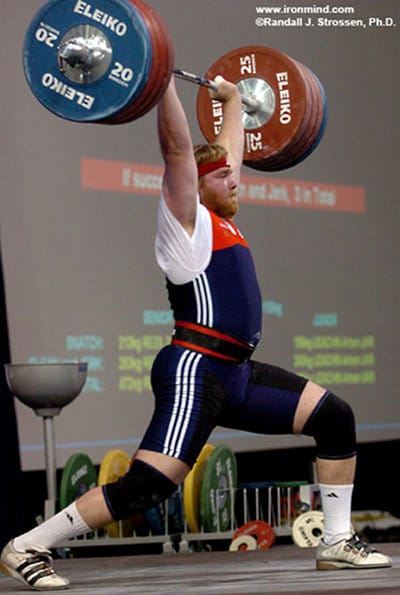
5. What is a typical day like for you? How many hours a day do you train?
Our training depends a lot on where we are in relation to a competition (time-wise). The further out we are, we’ll usually spend more time in the gym, and the closer we get, we’ll start to taper and rest up for the competition. Our week typically involves nine training sessions: twice a day on Monday, Wednesday, Friday, and then once a day on Tuesday, Thursday, and Saturday. Each session is around two hours, but that doesn’t include the time spent on recovery, rehabilitation, and active rest. It’s very realistic at times to be doing weightlifting related activities from 8 in the morning until 7 at night. I think it’s even more dramatic for sports like pentathlon and decathlon that have to train a large number of events. At other points of the year there can be a fair amount of down time, so a lot of athletes go to school or develop hobbies to help keep them occupied. Most play Call of Duty.
6. People like Hannah Teter have their own—really delicious—ice cream. But how do less high profile athletes support themselves as they train for the Olympics?
Unless you’re Michael Phelps, you’ll most likely have to get a job. Living at the OTC takes a lot of the financial burden away, so we really only need to make enough to pay for all the normal expenses one incurs, plus travel costs for national competitions.
Right now, my wife and I coach Olympic weightlifting part-time. She coaches at a Crossfit gym in town, and we’ll go with my father around the country instructing at Crossfit Olympic Weightlifting Certifications. Making ice cream doesn’t sound like a bad idea though.
For athletes who don’t live at the OTC, it’s a little trickier. Some have been able to get a couple sponsorship deals, but it’s usually for supplements or outfitting. Most Olympic sports aren’t really popular except for a couple weeks out of every four years, so we’re not exactly shoe-ins for multi-million dollar endorsement deals. Most athletes who compete in less well known sports don’t do it for any sort of compensation, so it’s fine, but there are plenty of Olympic gold medalists who will never come close to the salary of a fourth string quarterback in the NFL.
That being said, since you have to support yourself, you need a job that caters to your training and competition schedule, and doesn’t cause any negative effects on you physically or mentally. Most elite lifters I know work at a gym, but I’ve known others who have worked as bouncers, EMTs, waiters/waitresses, teachers, or were in the military’s elite athlete program.
7. What does an Olympian do after their competition career is over? What kind of job options are there for folks with such a unique resume?
For most athletes who don’t have any sort of education or training, they’ll usually go into coaching. This is by no means an obligatory career path though. If you’ve been involved with sports for awhile and are a competent hard worker, you can possibly get a job working for a National Governing Body, or with the United States Olympic Committee. The USOC does a great job of providing athletes with career opportunities during and after their athletic endeavors, but you always have to work for it, it’s by no means a handout.
I know of some athletes overseas who became involved in politics; one is a presidential aide, and another works for the Latvian Parliament. They did this without any formal training as far as I know, but I could be mistaken.
Even if an athlete decides that they want nothing to do with sports ever again, being able to put “Olympian” or “World Team Member” on a resume can say a lot to an employer about your work ethic and dedication to a goal or job.
8. What is the best part of your job?
Traveling and the thrill of competition. Since major weightlifting competitions are generally 3-6 months apart, we have the option to stay a couple extra days at a meet location to see the area. A lot of other sports don’t have that luxury since their season usually consists of one competition every week or even every couple of days. They fly in, sleep in the hotel, compete, and then fly out to the next competition or tournament.
The emotion that goes into competing is unparalleled. I used to throw up before every competition from being nervous, but I loved being there. There’s nothing like stepping on a platform in a foreign country and getting to push yourself to your absolute limits. It’s exhilarating.
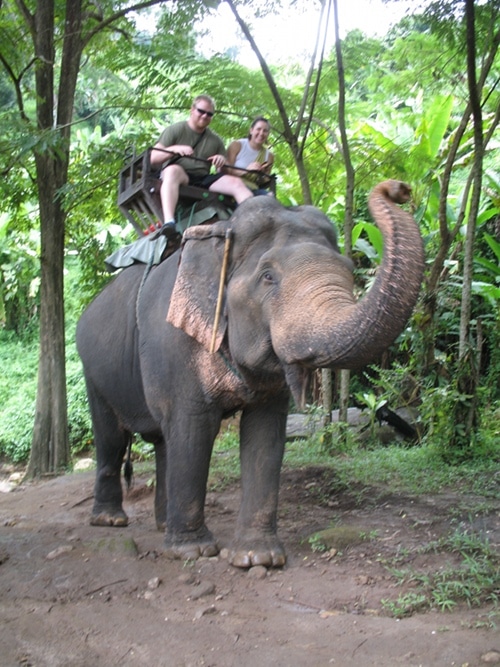
After the 2008 World Championships in Thailand, Casey proposed to his wife atop an elephant.
9. What is the worst part of your job?
The pressure of continuously improving, which especially grows as you start to approach your peaking age, and the sacrifices you make for your sport. Every job is going to require some sacrifice, and with being an athlete, every single thing you do needs to revolve around your sport. How you train, recover, what you eat, how much you sleep, etc., all play a part in your performance. Having to monitor your entire life 24/7 can cause an athlete to become unbalanced. I’ve had a lot of invitations to do some exciting activities with friends and family, but I’ve had to decline because I’ll have a hard week of training, a competition is coming up, or I need some extra rest from a previous session.
It’s also difficult sometimes to get past the notion that the amount of dedication and effort we give to reach the pinnacle of our athletic career (or Olympic dream) is really just for the entertainment of others.
10. What’s the work/family/life balance like?
Since my wife lifts weights as well, we get to spend plenty of time with each other. If one of us didn’t compete, I think it would be very manageable, but frustrating at times. Since athletics is typically a pretty selfish career, some things may be hard to deal with, like trying to find time to spend together with all the travel and a demanding training schedule. There are plenty of people who have families and are still able to train, but it’s probably just more difficult. I’m not a parent yet, but I’d imagine raising a child the way a man should requires a lot of self-sacrifice, which would be tough to do as an elite athlete.
11. What is the biggest misconception people have about your job?
That we are all on drugs (a whole other conversation altogether), eat ridiculously large quantities of food, and that we are powerlifters, bodybuilders, or compete in strongman competitions. I can’t even count the times I’ve told people I’m an Olympic weightlifter and the first thing they ask is “How much do you bench?” We don’t bench, curl, or do donkey calf raises.
12. It seems like most Olympians have been practicing their sport since they were knee-high-to-a-grasshopper. Are there any Olympic sports you can get into later in life or pretty much if you’ve graduated high school and aren’t on the path to the Olympics already, all hope is lost?
While most coaches agree it would be best to start when you’re shin high to a beetle, it’s not completely necessary. Again, a lot of it depends on the sport. Female gymnasts peak at 16 or 17, although I don’t know if many AoM readers have aspirations of becoming a female gymnast. Weightlifters usually peak in their mid-twenties, but that’s if they’ve been lifting since they were 9 or 10. Some of the greatest weightlifters in history didn’t start until they were 19 or 20 and became World champions in their early to mid thirties.
I’d say for most sports, athletes peak in their mid to late twenties, but there are numerous examples of competitors who are exceptions to that statement (e.g. Dara Torres). Once your twenties pass by, your chances start to dwindle quickly, but that doesn’t mean they disappear. If you’re older (over thirty) and want to participate in a sport, then shooting, archery, and curling are all very viable options if you want to compete. Susan Nattrass won the 2007 Pan Am Games, and competed in the 2008 Olympics in shooting, and she was born in 1950.
13. Any other advice, tips, commentary or anecdotes you’d like to share?
No matter what sport you get into, make sure you take the time to develop. A lot of people will undertake an athletic venture, and if they don’t become a world-class athlete within 6 months, they give up. Rather than quitting, they need to read your article on “Deliberate Practice,” which is spot on. You referenced Gladwell’s “Outliers,” and how it typically takes 10,000 hours to become an expert in a field. I think this is very true, although some people, who are genetically blessed and put in the time and effort, will just be a little further ahead after those 10,000 hours.
Another tip is to surround yourself with others who want to be successful. Find a coach who is knowledgeable and energetic about what they do, and train with people who chase perfection. The right people and environment makes a huge difference.
One thing I love about athletics is that you can’t measure heart, desire, and discipline. Less talented individuals who are willing to push themselves everyday will beat the favorite who doesn’t give that extra effort. Not to seem too cliche, but there’s this great Versus commercial that speaks exactly about that. It has a wonderful quote in it: “Passion has a funny way of trumping logic.” I’m not saying that somebody without a shred of athletic ability will win the Olympics, but if they push themselves and quiet that voice inside that tells them to quit, they’ll be able to go further than they ever thought possible.
Tags: So You Want My Job


